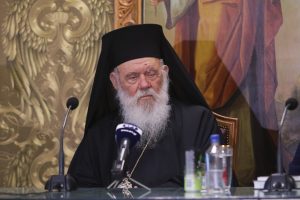The PM-designate of North Macedonia, Hristijan Mickoski, on Tuesday evening essentially announced a “double standard” in using the land-locked country’s constitutional name, slightly back-tracking from previously more inflammatory statements.
The soon-to-be prime minister Mickoski, taking his cue from the country’s recently elected president, Gordana Siljanovska-Davkova, has “resurrected” the previously resolved “name issue” between the one-time Yugoslav state and Greece by referring to the former as “Macedonia”, stand-alone. The latter is a violation of the 2018 Prespa Agreement.
The key point of the agreement, signed by the then government in Skopje and ratified during a heated debate by lawmakers in Parliament, changed the country’s constitutional name to Republic of North Macedonia, adding a geographic qualifier to “Macedonia” in order to differentiate the country from the neighboring province of Macedonia in northern Greece. The latter is the area that more closely approximates to ancient Macedon and comprises roughly half of geographical Macedonia.
Speaking to the country biggest private television station, Sitel, on Tuesday, the leader of the conservative VMRO-DPMNE party and premier-designate said the constitutional name – Republic of North Macedonia – will be used during the swearing-in of his new government over the weekend.
PM-Designate Mickoski said that he will also use the constitutional name in his contacts abroad with foreign leaders.
However, he added that within the country, in his public appearance and statements he will use the name “Macedonia”, stand-alone, claiming that for him “the name of his homeland is Macedonia”.
The “name issue” poisoned relations between Athens and Skopje for nearly three decades after the one-time Yugoslavia constituent state declared independence in 1991. Consecutive Greek governments said the name implied territorial claims on the Greek province of Macedonia, to the south of current North Macedonia, as well as attempting to appropriate Greek history and cultural legacy.
The Prespa Agreement also paved the way for the country’s NATO membership.



